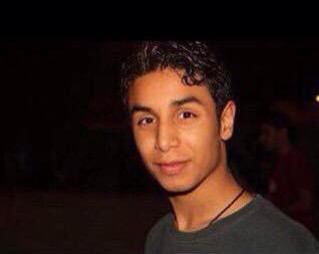Saudi Arabia: Juvenile prisoner faces 'death by crucifixion' after appeal is dismissed

A prisoner in Saudi Arabia, who was sentenced to death as a child, faces "death by crucifixion" after a final appeal has been dismissed. Ali Mohammed al-Nimr was arrested on 14 February 2012 when he was just 17, during a crackdown on anti-government protests in the Shiite province of Qatif. He was accused by the authorities of participation in illegal protests and of firearms offences, despite there being no evidence to justify the latter charge.
Ali was initially held at a juvenile offenders facility, where he was denied access to lawyers. Evidence indicates that he was tortured and forced to sign a document which was tantamount to a confession. The signed document formed the basis of the case against him and he was convicted of the alleged offences by the Specialised Criminal Court (SCC). However, the trials failed to meet international standards. Ali and his family have strongly denied the charges against him, but, after the final appeal - which was held in secret and without Ali's knowledge - was dismissed, there are few legal options remaining to oppose the sentence originally handed down on 27 May 2014. It is feared that Ali could be executed in a matter of days.
The case against Ali appears to be based on his familial connection to Sheikh Nimr al-Nimr, a 53-year old critic of the Saudi regime and a prominent religious leader in the Kingdom, who is his uncle. Mr Al Nimr was sentenced to death by crucifixion on charges including 'insulting the King' and delivering religious sermons that 'disrupt national unity'. This week, it emerged that the authorities plan to execute Ali's uncle on Thursday (17 September) sparking fears that his nephew will also be killed.

Human rights organization Reprieve has urged the European Union to intervene with Saudi Arabia to prevent the killings.
Commenting on the inhumane and unjust sentence, Maya Foa, Director of the death penalty team at legal charity Reprieve said: "No one should have to go through the ordeal Ali has suffered – torture, forced 'confession,' and an unfair, secret trial process, resulting in a sentence of death by 'crucifixion.' But worse still, Ali was a vulnerable child when he was arrested and this ordeal began. His execution – based apparently on the authorities' dislike for his uncle, and his involvement in anti-government protests – would violate international law and the most basic standards of decency. It must be stopped."
Ali is just one of a number of young protestors including Dawoud Hussain al-Marhoon, who have been sentenced to death following involvement in anti-government protests. In January 2015, prominent Saudi blogger Raif Al-Badawi received the first of 1000 lashes as part of his sentence for his statements criticising the Saudi regime in 2012.
In a post to the NGO's website Foa added: "Saudi Arabia's wave of executions since the start of this year has provoked widespread disgust. But these killings, if they are allowed to go ahead, will mark a new low."
Despite global condemnation, the Saudi Government has continued to carry out executions at a high rate since King Salman came to power in January 2015. On May 6th 2015, the Kingdom carried out its 79th execution of the year, and it is already close to surpassing its 2014 total of 87 executions. The Saudi government maintains all cases are tried in accordance with Sharia law, and with strict fair trial standards observed.
According to Amnesty International Saudi Arabia has one of the highest execution rates in the world, with only China and Iran carrying out more judicial killings.
A Facebook page has been created to rally support in protest at the death sentence on Ali Mohammed al-Nimr.
© Copyright IBTimes 2025. All rights reserved.






















